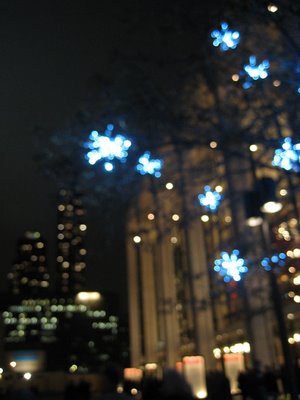16 November 2004
I Vespri Siciliani
Metropolitan Opera
(posted on Opera-L)
One isn't being unreasonable to suggest (gasp) Callas in describing the over-all affect of Sondra Radvanovsky's voice; indeed, both voices bear the dark veil of quiet suffering whatever the aria or context. Radvanovsky's instrument has grown a shade darker since her Trovatore Leonoras a couple of years ago, and has become significantly more flexible, but has thankfully lost none of its staggering volume. Last night she used the default emotion intrinsic to her instrument to produce a most heartrending "Arrigo! ah parli ad un core," and with such talent she is assured to be remembered by this generation of fans. However, to get to the next step up the kunst pantheon (where Scotto & company sit) would require greater emotive range and some risk-taking from Radvanovsky: specific to Elena, the anger and vengeance must be palpable from the moment she opens her music in Act I. Radvanovksy's take was to sing "In alto mare" as a dignified, quietly grieving woman and rely only on the intrinsic sadness in her timbre to propel the music into "in vostra man" and through "su corragio". Where was the unnerving thirst for vengeance, the acid fire that Callas/Gencer/etc. spewed? Elsewhere, Radvanovsky revealed another weakness: the steadfast refusal to use chest. It may be because she thinks she can get away with it, for I've noticed that her register break occurs lower than what is usual for sopranos, and with her ample vocal power she can push down to the limits of her head voice and get by without resorting to full chest. But chest, aside from giving those low notes the pleasing attention they deserve, can also be another emotive tool; therefore her refusal/inability to plunge down there substantially limits her interpretation.
Anyway, she's a young soprano with a young career, and the vocal development I have noticed the past couple of years signifies to me that she's headed in the right direction. To be compared to our favorite divas at this point in her life is true testament to her enormous talent and potential. Already she has defied the American curse by nurturing a distinct voice with personality and edge; now in order to succeed in this kind of repertory, she has only to delve deeper into the Latin aspect of her soul: i.e., show emotion beyond the dark veil, and please apply the chest!
According to a friend who has seen both the prima and last night's performances, Radvanovsky's technical marks have gone down from a 9 to maybe a 7.5, in terms of agility and cleanliness in ornamentation, and the singular matter of the high E natural. Even if I didn't attend the prima, I could tell she was a bit off, basing solely on the near-unanimous acclamation expressed on this list to date. The high E extravaganza that capped the bolero wavered slightly, and seemed to me to be a last-millisecond decision. Earlier in the evening, she was already being a bit tentative in reaching a couple of notes above the staff, and some of her ornamentations to me sounded a tad amateurish. But of course this is all nit-picking, and maybe my own knee-jerk response to everyone else's overwhelming adulation. Radvanovsky gets a couple of weeks off after this weekend's performance, thanks to the other Callas practitioner Nelly Miricioiu, so she should have ample time to rest and recover for the radio broadcast (which is always more unforgiving of those sylistic and technical slips).
I'll leave the analysis of the boys to others. In aggregate I agree with much of what has been said of Ramey (wobble galore), Casanova (beautiful tone but lacking in volume and stamina), and Nucci (noble, surprisingly fresh baritone). The maestro Frederic Chaslin seems too much of a pushover to the singers, giving in to everyone's selfish whim: the result is a collection of arias and scenes without unified dramatic progression and forward push. My intense desire for a caffeine injection during the evening was also due to (a) Verdi's lackluster dramatic structure (the composer had already created the tightly constituted Il Trovatore and La Traviata by the arrival of Vespri) and (b) the mind-numbing Dexter stairs that also induced mild vertigo. And really, what a silly production: scene changes via shifting of stairs from right to left; and I had a mental chuckle during Elena's Turandot-style costume change in the middle of the stage in the last act, from Sicilian black to bridal white, behind ladies-in-waiting holding up a makeshift curtain, with Radvanovsky carefully hidden from the audience but ostensibly in FULL view of a platoon of rugged Sicilian men crowding upstage. Yes, I know she merely put on the white on top of the black, but still the center-stage illusion of dressing/undressing remains, and therefore the silliness of the entire to-do as well.



















